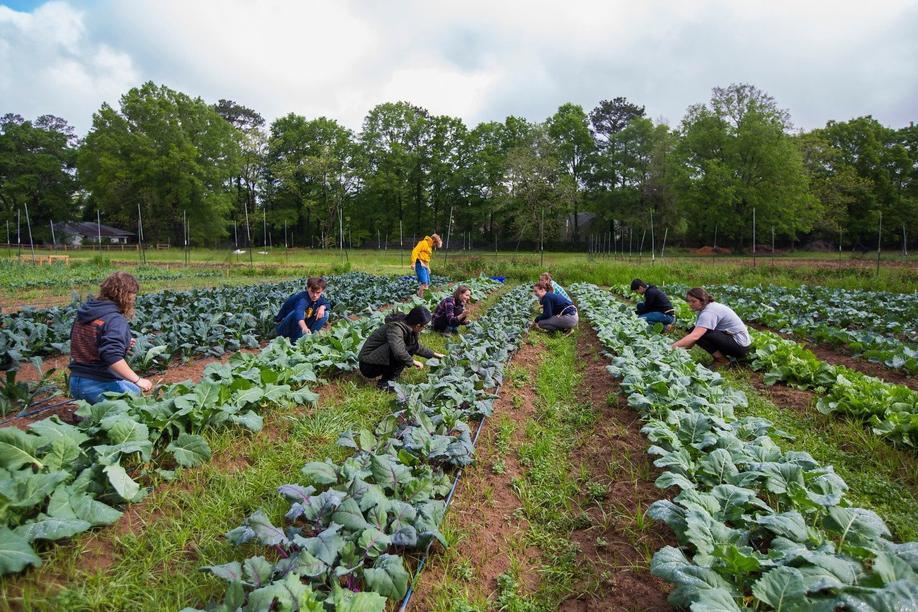
Photo: Kay Hinton
Article By Nedra Rhone, The Atlanta Journal-Constitution
The whims of Mother Nature have weighed heavily on Georgia farmers in recent years, but weather isn’t the only challenge they face. Developers have increasingly encroached on farmland, leaving farms vulnerable to the highest bidder and gradually reducing the amount of prime agricultural land in the state.
On Wednesday, Emory University, which has ambitious goals for using local and sustainable foods, announced a new partnership with the Conservation Fund’s Working Farms Fund that will help preserve local farmland and support entrepreneurial farmers while also building a sustainable solution to food production in the metro area. The Conservation Fund is dedicated to creating effective conservation solutions and has protected more than 140,000 acres of land in Georgia since 1985.
“Our commitment to purchase sustainably and locally grown food means the Conservation Fund will be able to provide better market opportunities for farmers as together we create an innovative new model for funding sustainable agriculture in our region,” said Ciannat Howett, director of sustainability initiatives at Emory.
Georgia first lady Marty Kemp applauded the organizations for taking an innovative approach to promoting agriculture in metro Atlanta. She has made a point of supporting products grown in Georgia.
Georgia has 10 million acres of agricultural land. Between 1992 and 2012, about 1.1 million acres was converted to development, making Georgia one of 12 states with the highest conversion rate as a percentage of agricultural land, according to the American Farmland Trust.
The Working Farms Fund is raising $11.4 million to acquire farmland within 100 miles of Atlanta. It will use conservation easements to permanently protect an initial 5,000 acres of land from development and practices that harm the environment. Emory will purchase the food grown by farmers in the program — at least 50 farmers by 2040 — to be sure there is a market for the crops. The program is expected to launch next year.
“We are seeing people getting into farming as a second career, veterans, women — all of these folks have a huge hurdle,” said John Piotti, president and CEO of American Farmland Trust, which is currently conducting an extensive survey of American land use. “The biggest barrier for all of them is cost. Protecting farmland and having a greater inventory of protected farmland in the state is one of the best tools that can be used.”
Farmers in the Working Farms Fund program will be selected based on the viability of their business, said Stacy Funderburke, co-director of the Working Farms Fund. “We will evaluate farm applicants based on a number of criteria, including farming experience, markets, business plans and match with individual farm sites,” he said, adding that the program is designed to benefit farmers who want to own their own farm but need a patient pathway to land access and ownership, including women, minority and young farmers classified as underserved by the USDA.
Under the partnership with Emory, the Working Farms Fund will purchase agriculturally significant land in the metro area — particularly farms that are at risk of being sold, fragmented or redeveloped — which it will then place under conservation easements to ensure it will only be used as farmland. The Conservation Fund will lease the land to farmers for five to 10 years, after which they can purchase the land typically at a lower cost. Removing development potential generally limits the market value of farmland, making it more affordable to potential farmers.
The food purchase agreement with Emory, one of the largest employers in the metro area, means those farmers will always have a buyer for their crops, providing a reliable stream of income for them to sustain their businesses. The agreement, along with Emory’s existing food purchase program with Oxford College, will also help push the university closer to meeting the goal of using 75% local and sustainable foods by 2025.
“We were looking at our options because we weren’t seeing enough local and sustainable food purchased to get to that goal, at least not in a way that was affordable to us,” Howett said. The university had even considered buying farmland, said Howett, who hopes the program will spur additional investments in the local food system.
Mindy Goldstein, director of the Turner Environmental Law Clinic, which represented Emory in the development and negotiation of the partnership, said the partnership will greatly benefit both Atlanta’s urban and rural communities.
“We hope it will serve as a model for local food systems across the country,” Goldstein said.
